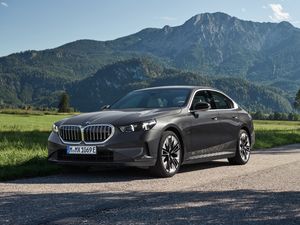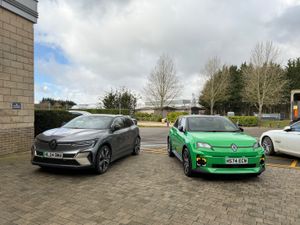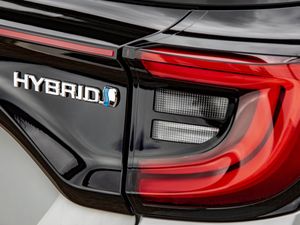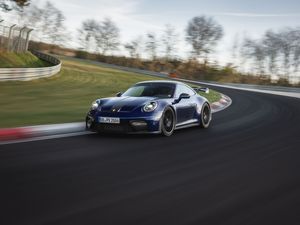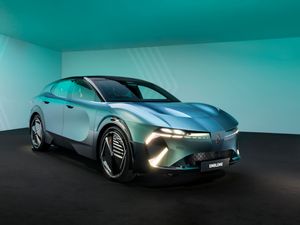Blog: British cars v American cars
Blog: Gas or Petrol? Whichever, but shouldn't we be using less? asks Shropshire expat Mark Ellis in his letter from America.
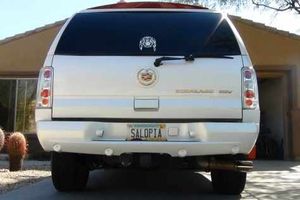
Blog: Gas or Petrol? Whichever, but shouldn't we be using less? asks Shropshire expat Mark Ellis in his letter from America.
Let's get this out of the way: I am guilty. I drive a gas-guzzling behemoth of a vehicle, but I have a good reason to do so. Maybe even a couple of good reasons, as I am sure everyone else claims to have. But I have done my time in small, fuel efficient cars, unlike most people here in Arizona.
I remember the first new car I bought, a shiny black Fiat Panda 1000 S, I think it was in 1988. I'd owned many used cars, working my way up from a 1969 VW Beetle that my parents bought me for £375 in a desperate bid to get me off a motorcycle.
I arrived at Waverley Garage in Shrewsbury to pick up the keys from my good friend Stephen Haylett. I recall he had hung some very attractive pink fuzzy dice from the rear view mirror and thrown in a full tank of petrol.
Our dog enjoyed the fuzzy dice and we were grateful for the petrol. I'd just bought a flat in London that needed lots of work so not having to spend money on petrol was a big deal even if it only was a tankfull.
I kept that Fiat for a long time, affectionately known as BT or Biscuit Tin, for obvious reasons and enjoyed its frugal 40+ mpg.
For whatever reason a US gallon is smaller than a UK or imperial gallon (a US Gallon is only 0.833 imperial gallons) but even compensating for that my current vehicle's 14 mpg is a little crazy in comparison to the Panda.
When talking cars in America there are a few things for which I still get mocked. The concept of a bonnet, boot, petrol, saloon and estate car are not too widely understood here, any more that driving on the wrong side of the road, in a right-hand drive car. (In American for the uninitiated - hood, trunk, gas, sedan and station wagon).
Size is an issue too - the biggest car I owned in the UK was a VW Golf GTI. Conversely, the smallest car I have owned in the US is a VW Rabbit.
Arriving in Arizona on a two-year contract, I didn't want to spend a fortune on cars only to take a huge loss when I sold them when upon leaving, so I looked for something cheap and typically American.
I had visions of cruising around in a mid-60's Mustang convertible with the warm wind in my hair and not a care in the world - that lasted until I started looking at prices.
I eventually bought a 1983 Cadillac Sedan De Ville - typically American (if you're 85 years old), cheapish at $3,000, but certainly no Mustang convertible.
It was huge – long and wide. It had two bench seats and would seat six people in comfort, a 4.1 litre V8, very shiny blue leather interior, and one of those strange padded vinyl roofs that you don't see in Europe unless you are watching re-runs of Ironside or Frank Cannon on TV.
Surprisingly the Caddy ran well and relatively inexpensively for a couple of years, by which time it became apparent that our stay would be a little longer than initially planned. At that point we decided we could buy some "proper" cars.
Since then I have worked my way through a couple of Mustang convertibles (from the '90's rather than the '60's), a few Sports Utility Vehicles (SUV's), and currently have one of the largest SUV's on the road.
Looking around when driving I am certainly not in the minority - a statement of fact rather than an effort to validate my choice of vehicle.
Drivers in America are fortunate to have lightly taxed, and therefore cheap, petrol. Currently in Scottsdale it is about $3.50 per gallon which is about $0.92 per litre, or £0.60, compared to the UK where it is approximately £1.40 per litre (courtesy of petrolprices.com).
In the US Federal tax per gallon is around $0.20 or about 6 per cent of the cost; in the UK the tax component before VAT is about 40 per cent - a huge difference.
There are many factors contributing to low taxation on petrol and as a result it is unlikely to change in the near future. For example, most cities were built on the premise that everyone drives to work so there is limited public transport, the oil and automotive industries have very powerful lobbyists in Washington DC, and historically no one would vote for anyone threatening to increase taxation on petrol.
There is limited financial incentive to buy a small car when running a large one is relatively inexpensive. Note the use of "financial incentive" – I recognise there may be many other reasons to drive small.
However, recently, there appears to be a growing trend towards buying smaller and more fuel efficient vehicles. The Mini is hugely popular, the Fiat 500 is starting to get a toe-hold, and Prius's are everywhere. Vehicles that might be considered large in the UK, such as 3-Series BMW's and E-Class Mercedes for example, are also very popular, which is an improvement on huge Cadillacs.
It will be a very long time before all the big vehicles disappear, particularly given the mysterious US love affair with the pick-up truck, but I believe in time it will happen. Maybe at some point even I will downsize.
So what are my reasons for driving a huge 4WD, 6.0 litre, V8, 14 mpg, 7-seater SUV? No different to most people really - I frequently have to drive more than four people long distances for football tournaments, I have a boat to tow, and I was rear-ended by an articulated lorry (Semi or 18-wheeler in the US) on a motorway (or freeway).
Maybe the last one is a little different to most people. There were six of us in the SUV and we all walked away. Since then, being surrounded by plenty of steel provides me with a little comfort, maybe misplaced, but comfort nonetheless.
And, to end on a controversial note, it is about time the speed limit was increased to 80 mph on the motorways of Britain. In fact why stop at 80? Introduce far stricter dangerous driving laws and increase it to 90.
I wish they would do it in Arizona but that is unlikely given they were only recently increased to 75.

